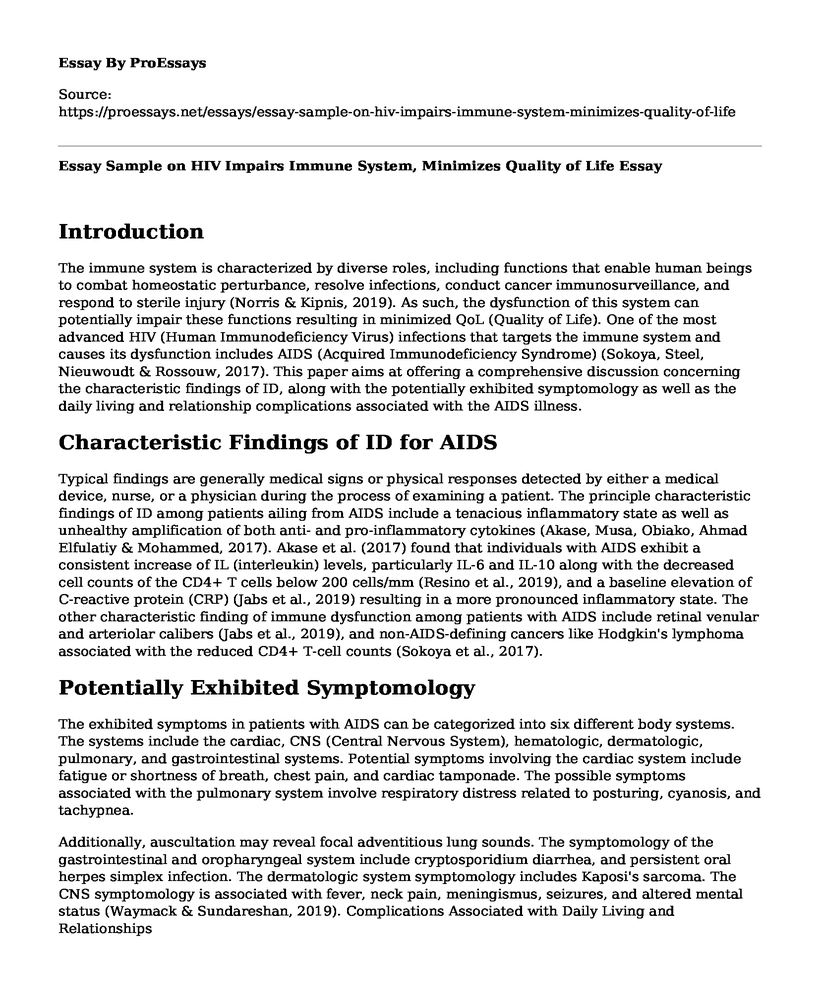Introduction
The immune system is characterized by diverse roles, including functions that enable human beings to combat homeostatic perturbance, resolve infections, conduct cancer immunosurveillance, and respond to sterile injury (Norris & Kipnis, 2019). As such, the dysfunction of this system can potentially impair these functions resulting in minimized QoL (Quality of Life). One of the most advanced HIV (Human Immunodeficiency Virus) infections that targets the immune system and causes its dysfunction includes AIDS (Acquired Immunodeficiency Syndrome) (Sokoya, Steel, Nieuwoudt & Rossouw, 2017). This paper aims at offering a comprehensive discussion concerning the characteristic findings of ID, along with the potentially exhibited symptomology as well as the daily living and relationship complications associated with the AIDS illness.
Characteristic Findings of ID for AIDS
Typical findings are generally medical signs or physical responses detected by either a medical device, nurse, or a physician during the process of examining a patient. The principle characteristic findings of ID among patients ailing from AIDS include a tenacious inflammatory state as well as unhealthy amplification of both anti- and pro-inflammatory cytokines (Akase, Musa, Obiako, Ahmad Elfulatiy & Mohammed, 2017). Akase et al. (2017) found that individuals with AIDS exhibit a consistent increase of IL (interleukin) levels, particularly IL-6 and IL-10 along with the decreased cell counts of the CD4+ T cells below 200 cells/mm (Resino et al., 2019), and a baseline elevation of C-reactive protein (CRP) (Jabs et al., 2019) resulting in a more pronounced inflammatory state. The other characteristic finding of immune dysfunction among patients with AIDS include retinal venular and arteriolar calibers (Jabs et al., 2019), and non-AIDS-defining cancers like Hodgkin's lymphoma associated with the reduced CD4+ T-cell counts (Sokoya et al., 2017).
Potentially Exhibited Symptomology
The exhibited symptoms in patients with AIDS can be categorized into six different body systems. The systems include the cardiac, CNS (Central Nervous System), hematologic, dermatologic, pulmonary, and gastrointestinal systems. Potential symptoms involving the cardiac system include fatigue or shortness of breath, chest pain, and cardiac tamponade. The possible symptoms associated with the pulmonary system involve respiratory distress related to posturing, cyanosis, and tachypnea.
Additionally, auscultation may reveal focal adventitious lung sounds. The symptomology of the gastrointestinal and oropharyngeal system include cryptosporidium diarrhea, and persistent oral herpes simplex infection. The dermatologic system symptomology includes Kaposi's sarcoma. The CNS symptomology is associated with fever, neck pain, meningismus, seizures, and altered mental status (Waymack & Sundareshan, 2019). Complications Associated with Daily Living and Relationships
The daily living complications faced by individuals ailing from AIDS include both psychological and physical morbidity along with poor QOL, which are associated with either low energy or fatigue. An additional complication includes pain linked with augmented difficulties to conduct daily chores. Complications related to relationships involve increased levels of stress associated with avoidance or disengagement coping strategies like conflictual, as well as social interactions (Cooper, Clatworthy, Harding & Whetham, 2017). Cooper et al. (2017) offered an example of the complications, including complex role functioning like educational and career pursuits, which is more limited than physical functioning in persons with AIDS, signifying that coping strategies like avoidance can potentially minimize a person's productivity.
Conclusion
This paper has offered a comprehensive discussion concerning the characteristic findings of immune dysfunction along with the potentially exhibited symptomology as well as the daily living and relationship complications associated with the AIDS illness. The report indicates that ILs, CD4+ T-cell counts, and CRP are the main characteristic findings for AIDS. Additionally, the paper has illustrated various systemic symptomologies, potential daily living as well as relational complications associated with AIDS that can potentially minimize QOL.
References
Akase, I. E., Musa, B. O., Obiako, R. O., Ahmad Elfulatiy, A., & Mohammed, A. A. (2017). Immune dysfunction in HIV: a possible role for pro-and anti-inflammatory cytokines in HIV staging. Journal of immunology research, 2017. DOI: https://doi.org/10.1155/2017/4128398
Cooper, V., Clatworthy, J., Harding, R., & Whetham, J. (2017). Measuring quality of life among people living with HIV: a systematic review of reviews. Health and quality of life outcomes, 15(1), 220.
Jabs, D. A., Van Natta, M. L., Trang, G., Jones, N., Milush, J. M., Cheu, R., ... & Hunt, P. W. (2019). Association of Systemic Inflammation With Retinal Vascular Caliber in Patients With AIDS. Investigative ophthalmology & visual science, 60(6), 2218-2225. DOI: https://doi.org/10.1167/iovs.18-26070
Norris, G. T., & Kipnis, J. (2019). Immune cells and CNS physiology: microglia and beyond. Journal of Experimental Medicine, 216(1), 60-70. DOI: https://doi.org/10.1084/jem.20180199
Resino, S., Navarrete-Munoz, M. A., Blanco, J., Pacheco, Y. M., Castro, I., Berenguer, J., ... & Benito, J. M. (2019). IL7RA rs6897932 Polymorphism Is Associated with Better CD4+ T-Cell Recovery in HIV Infected Patients Starting Combination Antiretroviral Therapy. Biomolecules, 9(6), 233. DOI: https://doi.org/10.3390/biom9060233
Sokoya, T., Steel, H. C., Nieuwoudt, M., & Rossouw, T. M. (2017). HIV as a cause of immune activation and immunosenescence. Mediators of inflammation, 2017. DOI: https://doi.org/10.1155/2017/6825493
Waymack, J. R., & Sundareshan, V. (2019). Acquired immune deficiency syndrome (AIDS). In StatPearls [Internet]. StatPearls Publishing. Retrieved from: https://www.ncbi.nlm.nih.gov/books/NBK537293/
Cite this page
Essay Sample on HIV Impairs Immune System, Minimizes Quality of Life. (2023, Mar 27). Retrieved from https://proessays.net/essays/essay-sample-on-hiv-impairs-immune-system-minimizes-quality-of-life
If you are the original author of this essay and no longer wish to have it published on the ProEssays website, please click below to request its removal:
- Snake Venom and Treatment of Cancer Essay
- The Future of Nursing: Leading Change, Advancing Health Essay
- An Analogy Between Terrorist Organizations and Cancer Cells Essay
- Scarcity of Resources in Healthcare Paper Example
- Essay Example on Addressing the Opioid Crisis: Addressing the Source
- Medication Non-Adherence in Chronic Diseases: Causes & Consequences - Essay Sample
- Essay Sample on Vitamin A: Essential for Vision, Growth and Immunity







